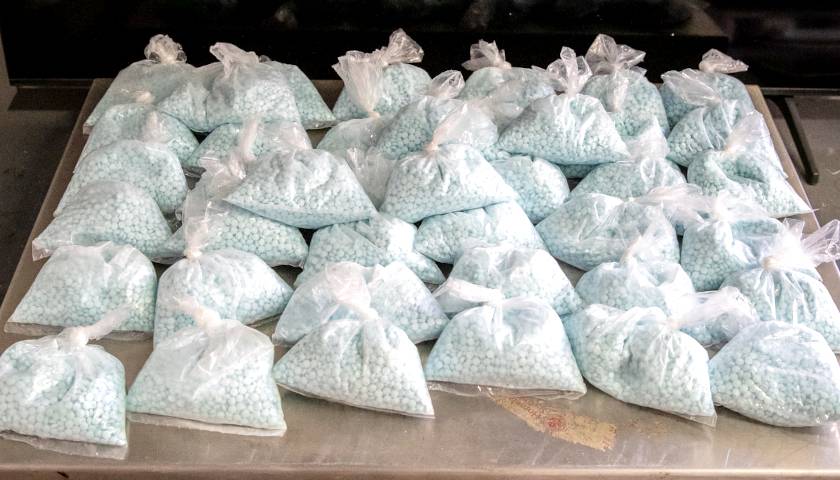by Steven Richards
A new report Tuesday detailing the Chinese Communist Party’s role in the fentanyl crisis plaguing the country details the findings of a House investigation that concluded the Chinese government subsidizes the manufacturing and export of fentanyl materials and refuses to crack down on the illicit market.
The report, released by the House Select Committee on the Chinese Communist Party, coincided with a public hearing with former Attorney General Bill Barr, former DEA Chief of Operations Ray Donovan, and an expert from the RAND research organization.
“As President Reagan once said, ‘If you want more of something, subsidize it.” Through its actions, the Chinese Communist Party is telling us that it wants more fentanyl entering our country. It wants the societal chaos and devastation that has resulted from this epidemic,” committee Chairman Mike Gallagher, R-Wis., said in his opening statement.
“And yes, it wants more dead Americans,” he added.
You can read the full report below:
The committee’s investigation found the Chinese government provides tax rebates to domestic companies that manufacture and export illegal narcotics, including fentanyl and similar chemicals.
The evidence also shows China continues to subsidize the manufacturing and export of fentanyl to this day, despite publicly claiming to crack down on the crisis.
According to government websites analyzed by the committee, the Chinese government made significant Value-Added Tax (VAT) rebates from 2018 to 2020 which “incentivized the export of at least 17 illegal narcotics that are Schedule I controlled substances and have no legitimate purpose,” the report concluded.
These rebates alone may have had a significant impact on the amount of fentanyl and fentanyl-like substances exported abroad, specifically to the United States. Studies cited by the committee found that for every percentage point increase in the VAT rebate for a product, exports increased by 13 percent.
There seems to be little doubt that the Chinese central government was unaware of this arrangement. VAT rebates for exports are directly overseen by the State Tax Administration, the central government agency that reports directly to the Chinese State Council—the highest government body which answers only to the President and Communist Party.
Additionally, the committee found the Chinese government actually increased the VAT rebate for fentanyl substances at least twice between 2018 and 2020, at the height of U.S. and Chinese diplomatic efforts to halt the drug crisis.
In 2019, China agreed to to add all fentanyl related substances to its controlled substances schedule. But, the VAT rebate policy is just the latest evidence to emerge of Chinese policy directly contradicting its promises. After the agreement, China was criticized for poor enforcement, especially as tensions between it and the United States increased during the Trump administration.
Not only did the committee identify the government subsidies, but also found the Chinese government provided grants and awards to companies which openly trafficked fentanyl.
In one case, the Shanghai local government provided grants to Shanghai Ruizheng Chemical Technology Co—a subsidiary of “the Richest Group”—as part of a “foreign trade stabilization project” for increasing exports. The Richest Group is a documented supplier of fentanyl products and openly advertises its offering of fentanyl precursors.
In another example, Gaosheng Biotechnology, a company known to sell fentanyl precursors and synthetic drugs online, was given awards from the government and received visits from government officials. Based on a review of corporate records, the committee identified a “widespread online presence” of sales accounts which “[boasted] of sales to the U.S., Mexico, U.K., Russia and Germany.”
At the time that Gaosheng sold “dangerous synthetic narcotics, including fentanyl analogues, U-47700, heroin, and methamphetamine,” these drugs were illegal under Chinese law. Gaosheng also noted that it was a state-owned enterprise and “enjoy[s] tax exemption privileges,” the committee found.
The committee found three other companies that trafficked illicit fentanyl materials and which were at least partially owned by the Chinese government.
Former Attorney General Bill Barr called this and other evidence uncovered by the committee “eye-opening,”
“The Committee’s work has uncovered persuasive evidence that the PRC and CCP are not just bystanders; they are the prime movers. They are knee deep in actively sponsoring, encouraging, and facilitating the production and export of fentanyl and fentanyl precursors for distribution in the United States,” Barr told the committee in his opening statement Tuesday.
In November, shortly after President Biden and President Xi met face-to-face on the sidelines of an important Pacific economic forum held in San Francisco, the Biden administration announced that China agreed to resume bilateral cooperation in counternarcotics, specifically to address the ongoing fentanyl crisis.
“[The] People’s Republic of China (PRC) announced the resumption of bilateral cooperation on counternarcotics, with a focus on reducing the flow of precursor chemicals fueling illicit fentanyl and synthetic drug trafficking,” the Biden administration’s press release reads.
“The PRC is now taking law enforcement action against illicit precursor suppliers, has issued a notice to industry warning Chinese companies against illicit trade in precursor chemicals and pill presses equipment, and has committed to restart key law enforcement cooperation,” it continued.
The press release states that the PRC has agreed to advise domestic industry on the enforcement of drug laws, take law enforcement action against synthetic drug and precursor suppliers, and resume cooperation through an international narcotics database used to track potentially illicit shipments worldwide.
However, the new report from Congress shows China has previously said one thing while doing another. China has had a poor record of complying with agreements, especially when it comes to fentanyl, Just the News reported in November.
– – –
Steven Richards is a reporter at Just the News.
Photo “Bags of Fentanyl” by U.S. Customs and Border Protection.




